Richard Caddel
Minor Poet, Not Conspicuously Dishonest:
Basil Bunting at 100
Basil Bunting: Complete Poems; Associate Editor Richard Caddel.Newcastle upon Tyne, Bloodaxe Books, 2000. 244pp ISBN 1 85224 527 1. £9.95
Two audio cassette recordings of Bunting reading "Briggflats" and other poems are also available from Bloodaxe Books, ISBN 1 85224 528 X. If your browser has the "RealAudio" plug-in you can listen now to a recording of Bunting reading a short poem, "At Briggflats meetinghouse". If you'd like to obtain the free RealAudio plug-in for your browser, go to http://www.real.com/ and follow the instructions to download the basic model.
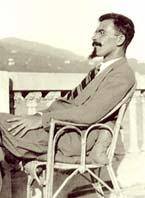
Basil Bunting, Rapallo, Italy, 1930s. From a photograph in the Basil Bunting Poetry Archive, Durham University.
This piece is 2,000 words or about seven printed pages long.
BASIL BUNTING'S POEMS should need little or no introduction these days: they have established their individual place amongst the twentieth century's finest poetry in English and sound as clearly now as they have ever done - to the delight of the "unabashed boys and girls" for whom they were composed. Bunting himself kept explication of his poems to an absolute minimum, and I have no intention of departing from that principle - "Never explain" he advised fledgling poets "your reader is as smart as you." A wealth of explanation, biographical and poetical, can be found in the bibliography below.
Yet some context may help, perhaps, to present this "Centenary Edition" to readers in a new century and to a generation coming to the work without having known the man. I'm happy to accept the invitation of the publishers and the poet's estate to provide such context, whilst encouraging pure poetry-lovers to cut direct to the poems.
Read these poems aloud: Bunting's central statement on poetry, as significant today as it was when first published in 1966, is that "poetry, like music, is to be heard." As a statement, this has been picked over, carped at, qualified and explained away by critics ever since, so that it's worth restating it here, in its original, radical essence:
"Poetry, like music, is to be heard. It deals in sound - long sounds and short sounds, heavy beats and light beats, the tone relations of vowels, the relations of consonants to one another . . . Reading in silence is the source of half the misconceptions that have caused the public to distrust poetry."
Such a conviction was deeply rooted in his upbringing and development, and was the product of a lifetime's practical experience. Born in Scotswood-on-Tyne on 1 March, 1900, Bunting grew up close to the vibrant oral traditions of the North-East of England at the start of the twentieth century - active traditions of spoken poetry and sung ballads. One of his earliest memories was of his nurse singing Northumbrian folksongs.
Such origins remained close to him throughout his eventful life and informed his approach to poetry as much as did his association with modernist contemporaries such as Pound, Eliot and Zukofsky. These undoubted giants of modernism all made nods in their own ways towards the importance of music and sound in their work, but it is left to Bunting, sometime musician, singer and professional music critic, to enunciate the primacy of sound in poetry so extremely, and to put it into practice.
Poetry readings were not common when Bunting was undergoing his poetic apprenticeship - nevertheless, he recalled hearing one of his own early Odes (I:3: "I am agog for foam") recited by Yeats, in the slow, orotund manner of the latter's public readings. Recorded evidence of Bunting's readings is all from the later stages of his life - yet it seems that, from the first, Bunting struck out and away from this grand manner, towards a precise and measured speech which related to that of his Quaker schooling, rather than to the celtic mists. A full study of the evolution of reading styles of modernism remains to be attempted - nevertheless, we can suggest that Bunting's reading styles (they vary, radically, over time and place) show a marked departure from those of his peers. For today's listener, they retain their vigour and strength over the years and have led through to the most exciting modes of performance which are around today.
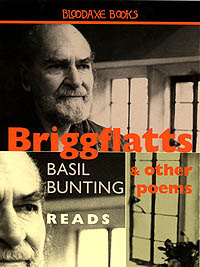
We are not all trained readers of poetry today. For the new reader, the first experience of sounding these poems in the air, however inexpertly, will be physical - nervous perhaps - but above all enriching. Word patterns which may at first appear dense and complicated on the page become articulated and clarified, resonating across the poems' structure. The subtleties and echoes of language which hold a poem together are revealed by the process of sounding it. Bunting would say that you should hear the "meaning" of the poetry purely in the sound. Some may choose to demur at such an extreme idea - nevertheless, those who have tried it assert that sounding these poems aloud reveals levels of meaning which are lost in silent reading. It's a technique - and a test - which is worth trying on other types of poetry too.
Reading through these poems you may also hear in passing the patient stages in which Bunting's work took shape. First comes the early, self-consciously modernist phase in which he paid his debts to Pound.
Next, the increasingly confident and complex period before and immediately after the war when he had found his unique voice and experimented with sound strategies from poetries of many different languages and cultures.
Then comes the mature flowering - the "Briggflatts period" - following his return to the North East in the early 1950s. Briggflatts itself, Bunting's celebration of northern home-place and love, was the poem which established his reputation at last, and for many it remains the primary achievement of post-war English poetry.
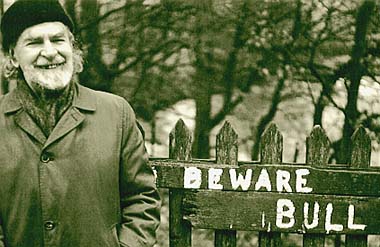
Basil Bunting beside the River Rawthey, Cumbria, 1980. Photograph © Jonathan Williams, 1994, 1998
And then finally, towards the very end of the collection you can detect clearly the beginnings of a new phase - denser and more closely structured - which was curtailed by age and death. Academics will tease out the precise delineations of such zones - "Follow the clue patiently and you will understand nothing" says Bunting - the point here is to register the ways in which Bunting was always developing and progressing his craft, with a seriousness which can be tracked through his career (Odes I:11; I:36; I:37 and II:6 tell the story). It is this spirit of consistent innovation and discovery, combined with his approach to sound, which has led to Bunting's high status amongst many younger poets today.
It has been asserted that there are no direct "heirs" to the poetic tradition of Bunting and other British modernists - and in terms of poets who have slavishly copied his mode of writing that is of course true. Nevertheless, when you read these pages, you will make discoveries which have inspired a great number of emerging British and American poets over the last few decades, and led to developments which are clearly foreshadowed in Bunting's work.
"You are proceeding along the right lines", wrote Bunting to one apprentice poet, "They'll lead you beyond the station I stop at, if you keep your mind alive." If this work was stopped at a station in the late twentieth century, it will resonate, we feel, to lively poetic minds long into the twenty-first.
Bunting's poems accumulated slowly. A youthful slim pamphlet was privately printed in Milan in 1930. Titled Redimiculum Matellarum (roughly, "A Necklace of Chamberpots") it had one review - from his friend Louis Zukofsky - and otherwise disappeared without trace. His first substantial collection came when he was fifty, with the publication of Poems: 1950 (Cleaner's Press, Galveston). Here we find for the first time the basic arrangement (Sonatas: Odes: Overdrafts), and to a great extent the sequence of poems which was to be worked on and added to over the next thirty-five years.
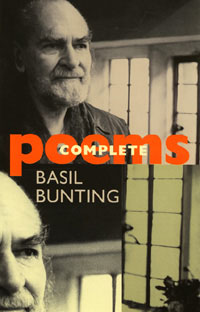
Loquitur (1965), published by Stuart Montgomery's Fulcrum Press, extended the range and tinkered the sequence towards its final form. At the same time came The Spoils (from the Morden Tower Bookroom, 1965) and at last Briggflatts (Fulcrum, 1966). The history of the writing of Briggflatts - how it was stimulated to a great extent by the crucial encouragement of the young Tyneside poet Tom Pickard, and how, an object lesson in precision, it was cut to its present length from over two thousand lines - is well chronicled elsewhere. Briggflatts was a success from the moment it was first performed, appropriately, at Tom and Connie Pickard's Morden Tower, Newcastle, on 22 December, 1965.
Loquitur, The Spoils and Briggflatts, together with the Second Book of Odes, were gathered together in Fulcrum's Collected Poems (1968), the collection which confirmed Bunting's reputation in Britain and America. This edition was reproduced, with some extra poems and corrections, by Oxford University Press (1978). A final ode (II:12) was added to an American edition (Moyer Bell, Mt. Kisco, 1985) nine days before his death.
This edition presents a complete corrected resetting of the final text of Bunting's Collected Poems as it stood at his death in 1985. That is the heart of the book. To that is added - in its proper place - work which remained uncollected at that time: the long poem-translation for children which Bunting had sought to publish separately in his lifetime, and other poems and translations which had fallen by the wayside. In the short appendices are all that he published in the way of juvenilia, and two limericks. Much of this supplementary work was gathered in Uncollected Poems (Oxford University Press, 1991).
A word must be said about that book, which infuriated Bunting purists by presenting work which Bunting had published, but chosen not to collect in his lifetime. The necessity of collecting such work was made plain by the trickle of well-meaning but often misleading publication of this material which began almost as soon as he died, and its place is now, I believe, justified in its context by its intrinsic interest. Readers will want to look at the full range of the work which he published, whilst respecting his own construction of Collected Poems. A fuller Editor's Preface provides more context to that work as it occurs in this collection.
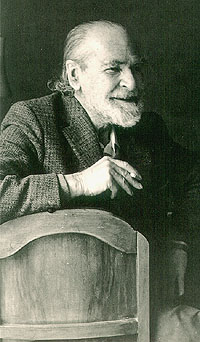
Basil Bunting, Blackfell, Washington New Town, 1982 (detail)
Photograph © Joanna Voit 1994
Print in the Basil Bunting Poetry Archive, Durham University Library
Published as a fine art postcard by the Basil Bunting Poetry Centre, Durham University Library, Palace Green, Durham DH1-3RN, United Kingdom.
And so all this material was brought together in The Complete Poems (Oxford University Press 1994) bringing all Bunting's published poetry together in a single volume. The present edition from Bloodaxe is a resetting of that, tweaking into place some errors from the earlier edition. It presents the work, appropriately, from a Northern publisher, for a new generation of readers - and crucially, listeners: for this edition is the first to be accompanied - again appropriately enough, surely - by a two-volume selection of recordings of Bunting reading his own poetry. The next stage, it must be urged, is for readers to begin to sound the words themselves.
The title of the collection remains potentially misleading: an academically complete edition, which would contain all Bunting's fragments and variants, letter-poems, and poems of dubious ascription, must await another editor in an age when all the manuscript and typescript remains of Bunting have been docketed and indexed. As partial repayment of my own debt to Bunting, my task has been to maintain the shape of a book which is complete for readers of poetry.
I remain grateful for the continuing support and encouragement, into the new century, of Bunting's family, Sima Bunting, Tom Bunting and Maria Elliott, and of his executor John Halliday. Not all poets are so fortunate in their surviving kinfolk. I also acknowledge my debt to colleagues and supporters of the Basil Bunting Poetry Centre at Durham University; and to individuals such as Peter Makin and Peter Quartermain, for their comments and advice, and to my family, for their support and patience. Errors and oversights remain my own.
Richard Caddel
Durham / August 1999
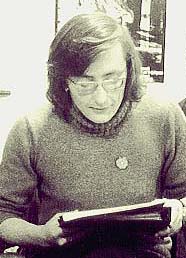
Richard Caddel reading at Morden Tower, Newcastle-upon-Tyne, 1975, photo © David James 1998,1999
Richard Caddel is a Director of the Basil Bunting Poetry Centre at Durham University. He is also the editor of Pig Press, and the author of three collections of poetry including Larksong Signal (1997), and co-editor of OTHER : British and Irish Poetry since 1970 (1999). You can read an extended version of the Introduction to that book by Richard Caddel and Peter Quartermain in Jacket # 4.
¶ You can read nine
poems by Richard Caddel about popular songs in issue # 6 of Jacket magazine.
¶ You can check the Bunting Centre's plans to celebrate Bunting's
centenary from their website at http://www.dur.ac.uk/~dul0www1/index.html
Basil Bunting: Complete Poems; Associate Editor Richard Caddel.Newcastle upon Tyne, Bloodaxe Books, 2000. 244pp ISBN 1 85224 527 1. £9.95
Two audio cassette recordings of Bunting reading "Briggflats" and other poems are also available from Bloodaxe Books, ISBN 1 85224 528 X.
If your browser has the "RealAudio" plug-in you can listen to a recording of Bunting reading a short poem, "At Briggflats meetinghouse". If you'd like to obtain the free RealAudio plug-in for your browser, go to http://www.real.com/ and follow the instructions to download the basic model.
This is the Contents List of the tapes:
Tape 1: Studio Set - Side A
1. Briggflatts 59-74
Parts I, II & III
Running Time: 30.04
Tape 1: Studio Set - Side B
2. Briggflatts 75-81
continued: Parts IV, V & coda
3. Selected Odes -
'Dear be still' (I:9) 105
'Narciss, my numerous cancellations prefer' (I:1 I) 107
'An aries, an aries for my hiring' (I:12) 108
'On the Fly-Leaf of Pound's Cantos' (I:37) 132
'Mesh cast for mackerel' (I:22) 119
'The soil sandy and the plow light' (I:31) 126
'Let them remember Samangan' (I:32) 127
'These tracings from a world that's dead' (I:34) 129
'Stones trip Coquet burn' (II:10) 144
Running Time: 29.32
Tape 2: Live Set - Side A
4. Selected Odes & Overdrafts -
'Now we've no hope of going back' (II: 2)146
'You can't grip years, Posthume' (Overdrafts) 16 1
'Snow's on the feilside' (Overdrafts) 221
'A thrush in the syringa sings' (II:1) 135
'0, it is godlike to sit selfpossessed' (II:7) 141
'You idiot' (II:4) 138
'All the cants they peddle' (II:9) 143
'Stones trip Coquet burn' (II:10) 144
'Carmencita's tawny paps' (II:8) 142
'Southwind, tell her what' (I:29) 124
'You leave' (I:28) 123
'Two hundred and seven paces' (I:26) 122
'At Briggflatts meetinghouse' (II:11) 145
What the Chairman told Tom (II:6) 140
Running Time: 27.07
Tape 2: Live Set - Side B
5. Villon 25-29
6. The Spoils 47-58
Running Time: 34.22
Italicised numbers above are the page numbers of the poems in Complete Poems by Basil Bunting (Bloodaxe Books, 2000). Those in brackets are the poem numbers in his two Books of Odes. Published by Bloodaxe Books Ltd, P.O. Box 1SN, Newcastle upon Tyne NE99 1 SN
A Bunting Bibliography
Most publication on Bunting, significantly, has happened since his death - he would surely never have approved personally of much of it. Nevertheless, the reader looking for more information on his work has now a range of sources in print to which to turn, and some of them - notably Makin's work - are excellent. The following, it must be stressed, is a highly selective list.
Keith Aldritt: The Poet as Spy: The Life and Wild Times of Basil Bunting. London, Aurum Press 1999.
Basil Bunting: A Note On Briggflatts. Durham, Basil Bunting Poetry Archive 1989.
Basil Bunting: Basil Bunting on Poetry, ed. Peter Makin. Baltimore, Johns Hopkins University Press, 2000.
Basil Bunting: The Recordings of Basil Bunting [8 cassette tapes], ed. Richard Swigg. Keele, Keele University in association with the Basil Bunting Poetry Centre 1994.
Richard Caddel ed.: Sharp Study and Long Toil: Basil Bunting Special Issue. Durham, Durham University Journal in association with the Basil Bunting Poetry Centre 1995.
Richard Caddel and Anthony Flowers: Basil Bunting: A Northern Life. Newcastle, Newcastle Libraries and Information Service in association with the Basil Bunting Poetry Centre 1997.
Victoria Forde: The Poetry of Basil Bunting. Newcastle, Bloodaxe Books 1991.
Peter Makin: Bunting: The Shaping of his Verse. Oxford, Clarendon Press 1992.
Peter Quartermain: Basil Bunting: Poet of the North. Durham, Basil Bunting Poetry Centre 1990.
Carroll F. Terrell ed.: Basil Bunting: Man and Poet. Orono, National Poetry Foundation 1981.
it is made available here without charge for personal use only, and it may not be
stored, displayed, published, reproduced, or used for any other purpose
This material is copyright © Richard Caddel and Jacket magazine 1999
The URL address of this page is
http://jacketmagazine.com/10/cadd-bunt.html
